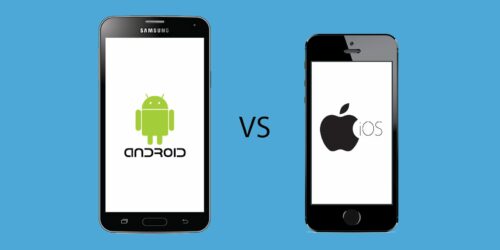In today’s digitally driven world, mobile applications have transformed the way we interact with technology. When businesses embark on the journey of creating a mobile app, they face a pivotal decision: should they develop for Android or iOS? Each platform offers its own set of opportunities and challenges. In this comprehensive guide, we’ll explore the key differences between Android app development and iOS app development, helping you make an informed choice for your next mobile project.
Introduction
Mobile app development has become synonymous with innovation and user engagement. Whether you’re a startup venturing into the digital realm or an established business looking to expand your mobile presence, understanding the distinctions between Android and iOS app development is crucial. Let’s delve into the core differences that can shape your development strategy.
Android App Development:
Market Share and Audience:
Android enjoys a larger global market share due to its presence on a wide array of devices.
It caters to a diverse audience, including emerging markets with various economic backgrounds.
Development Language:
Android apps are typically developed using Java or Kotlin, offering developers flexibility in their choice of language.
Development Tools:
Android development thrives on Android Studio, an Integrated Development Environment (IDE) equipped with robust features.
User Interface (UI) Design:
Android adheres to Material Design guidelines, emphasizing clean layouts, bold colors, and intuitive interactions.
Fragmentation and Device Compatibility:
The Android ecosystem exhibits device fragmentation, requiring developers to ensure compatibility across various screen sizes and hardware specifications.
App Submission and Approval:
The Google Play Store has a relatively streamlined app approval process compared to Apple’s App Store.
Monetization Options:
Android users often prefer free apps with advertisements and in-app purchases.
Fragmentation and Updates:
Android devices may not receive timely software updates, leading to variations in the operating system across devices.
Development Community and Resources:
The Android developer community is vast and offers a wealth of resources, making it easier for developers to find solutions and support.
Customization and Open Source:
Android is open source, allowing for extensive customization and the creation of unique user experiences.
iOS App Development:
Market Share and Audience:
iOS caters to a more exclusive audience, primarily using Apple devices, which are commonly found in developed economies.
Development Language:
iOS apps are crafted using Swift or Objective-C as programming languages, known for their efficiency and performance.
Development Tools:
iOS developers typically rely on Xcode, Apple’s official IDE, offering a range of tools and resources.
User Interface (UI) Design:
iOS follows Human Interface Guidelines, emphasizing simplicity, clarity, and content-focused design.
Fragmentation and Device Compatibility:
iOS devices boast standardized screen sizes and hardware, simplifying app development and ensuring consistent user experiences.
App Submission and Approval:
Apple’s App Store enforces stringent app review guidelines, resulting in a meticulous approval process.
Monetization Options:
iOS users tend to spend more on apps, making it potentially more lucrative for premium or paid apps.
Fragmentation and Updates:
iOS devices receive regular software updates, ensuring a uniform user experience across devices.
Development Community and Resources:
The iOS developer community, while smaller than Android’s, is highly active and offers extensive documentation and support.
Hardware Integration:
iOS devices are known for their seamless hardware integration, enabling developers to fully leverage device-specific features.
Conclusion
In conclusion, the choice between Android app development and iOS app development should align with your target audience, project requirements, budget, and technical capabilities. Each platform has its unique advantages and considerations, and understanding these distinctions is pivotal in shaping your mobile app strategy.
Whether you opt for Android, iOS, or choose to develop for both platforms, Websoft Techno is your trusted partner in the realm of mobile app development. Our team of experts is dedicated to turning your app vision into a reality, ensuring high-quality, tailored solutions that meet your specific needs.
For more information about our services and how we can assist you in achieving your mobile app development goals, visit www.websofttechno.com or contact us at +91 9922442272 or +91 9850944480. Your vision is our mission, and we’re here to guide you through the dynamic landscape of mobile app development.
With the insights provided in this guide, you’re now equipped to make an informed decision regarding your next mobile app development project. Whether you prioritize the widespread reach of Android or the refined user experience of iOS, your choice will play a pivotal role in the success of your app and its reception in the ever-evolving world of mobile technology.

